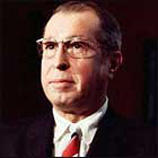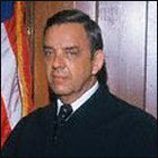|
Home
|
Miers In Historical Perspective
It just seems that the nomination of a Southerner to the U.S. Supreme Court brings out the insanity of the Republican Party. The Harriet Miers nomination has certainly done that. There's a huge fuss over her position on abortion - usually expressed as "her views on Roe vs. Wade." Well, guess what Republicans. Your insanity over the nomination of a couple of Southern judges to the Supreme Court led directly to Roe vs. Wade - that's right, the abortion decision is your fault. This story, like many, goes back to the 60s. In 1968, the Democratic Party was well on the road to self-destruction. Instead of reforming the State Democratic Parties in the South, where the party could count on a lot of votes, the national party set out to destroy the state parties and drive away as many Southern voters as possible. At the Democratic National Convention held in Chicago that year, legally elected state delegations from the South were thrown out in favor of reform delegations. The reform delegation from Georgia, for instance, was led by Julian Bond - a man who had earned the ire of most folks in the state for his views on Vietnam. When Richard Nixon won the 1968 election, one holdover problem from the previous Johnson Administration were vacancies on the Supreme Court. Johnson crony Abe Fortas had been run out of town on a rail after being nominated to replace Earl Warren as chief justice. Shortly after his inauguration, Mr. Nixon nominated, and the Senate confirmed, Minnesotan Warren Burger as chief. The administration saw a chance to gain strength for the Republican party in the South, so Mr. Nixon promised to appoint a Southerner to the open associate justice spot. Haynsworth had owned about 1/7th of a vending machine company. The company did business with a lot of other businesses and one of those businesses was a textile firm. The critics found a decision by Haynsworth ruling in favor of the textile firm, and claimed it amounted to a conflict of interest. Haynsworth said he never knew of any connection between the two companies. The smoking gun may have only been a pop gun, but it was enough to get 17 Republicans to join 38 Democrats and defeat Haynsworth's nomination. It was the first time in 40-years that an associate justice nominee had been defeated. President Nixon then turned to what would now be called a stealth candidate. G. Harrold Carswell was from Georgia, had graduated from the U.S. Naval Academy and then from The University of Georgia Law School. He had served as U.S. Attorney for the Northern District of Florida, then as a judge in the same district. Mr. Nixon appointed him to the Fifth Circuit Court of Appeals in 1969, and he passed Senate muster. Mr. Nixon then felt that he had fulfilled his promise. He had nominated two Southerners and he could blame their defeat on his enemies - the civil rights groups, the AFL/CIO and the Democrats. He then turned to a bland candidate no one could oppose. He chose Chief Justice Warren Burger's childhood friend, Harry Blackman. Blackman went on to find the right of privacy in the Constitution (even though, of course, the Constitution does not give people rights) and write the majority opinion in Roe vs. Wade. So, there you have it Republicans. You are the ones who are responsible for the decision in the case you complain about most - Roe vs. Wade. Without your opposition to Haynsworth and Carswell, so similar to your opposition to Miers, there may be no Roe vs. Wade decision. I don't know enough about Miers to make a decision about her. I'll be watching the confirmation hearings. But I'll keep in mind that an emotional reaction to a nomination may have long-term consequences.
|
 In 1969, President Nixon nominated Clement Haynsworth, a South Carolinian who had graduated from Furman University, then Harvard Law in 1936. Haynsworth had been appointed to the 4th Circuit Court of Appeals by President Eisenhower in 1957, and thus had an extensive record of judicial opinions. Civil rights groups and labor unions went nuts, but so did a lot of Republicans. It was clear they were looking for any excuse to keep a Southerner off the Court. Haynsworth's decisions were closely examined, and his critics found a smoking gun, or so they said.
In 1969, President Nixon nominated Clement Haynsworth, a South Carolinian who had graduated from Furman University, then Harvard Law in 1936. Haynsworth had been appointed to the 4th Circuit Court of Appeals by President Eisenhower in 1957, and thus had an extensive record of judicial opinions. Civil rights groups and labor unions went nuts, but so did a lot of Republicans. It was clear they were looking for any excuse to keep a Southerner off the Court. Haynsworth's decisions were closely examined, and his critics found a smoking gun, or so they said. But when Carswell was nominated for the Supreme Court vacancy only a year later in 1970, the same civil rights groups and labor unions opposed him. He was also criticized for not having much of a judicial record for them to pick through. So, instead, they went back 22-years to find a speech Carswell had made during a campaign for the Georgia legislature. Remember that in 1948, rightly or wrongly, the law in Georgia was segregation, and Carswell's speech supported segregation. Again it was enough of a smoking pop gun to get 13 Republicans to vote against him. He was rejected 51-45.
But when Carswell was nominated for the Supreme Court vacancy only a year later in 1970, the same civil rights groups and labor unions opposed him. He was also criticized for not having much of a judicial record for them to pick through. So, instead, they went back 22-years to find a speech Carswell had made during a campaign for the Georgia legislature. Remember that in 1948, rightly or wrongly, the law in Georgia was segregation, and Carswell's speech supported segregation. Again it was enough of a smoking pop gun to get 13 Republicans to vote against him. He was rejected 51-45.